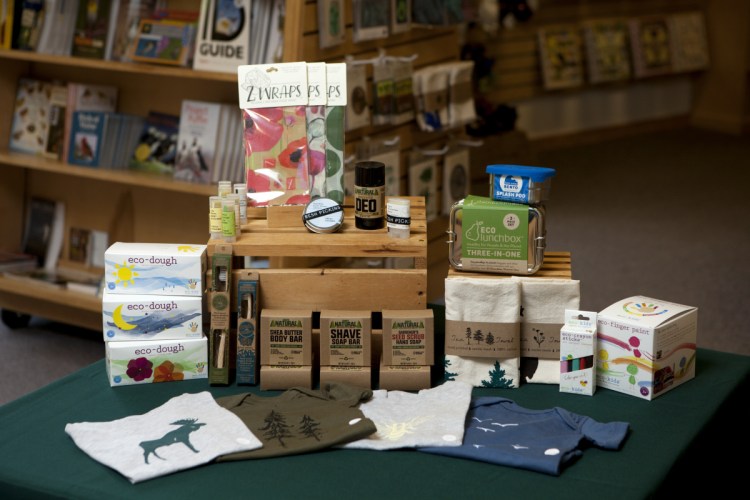We’re going to take a break from our usual format this week to bring you news of a fresh source of sustainable products for the home: the Nature Store at Maine Audubon’s Gilsland Farm in Falmouth.
The store, known for selling things like bird feeders, field guides and wind chimes, has created a new section called “Sustainable Home.” And leave it to Maine Audubon to take special care stocking the area. Indeed, many of the products in their line-up are things we’ve researched and written about here – environmentally-friendly tea towels, for example, and EcoKids crayons, finger paint and sculpting clay.
Other items, such as reuseable food wraps made of beeswax, are similar to Maine-made products we’ve featured.
Sustainable Home was put together by Lydia Coburn, a new employee (and interim manager of the store) who has a degree from Hampshire College in conservation biology and environmental sustainability. She’s studied consumer products that contain things like chemicals and microplastics, and examined how they might affect environmental and human health from “cradle to grave.” To stock the store, Coburn surveyed the Maine Audubon staff, talked to customers, and shopped at product shows to get ideas.
She used four criteria for choosing products: One, transparency. If it took her more than 5 or 10 minutes exploring a company’s website to figure out where they sourced their materials, she crossed them off her list. Two, integrity. Knowing where a product comes from is great, Coburn said, but if it’s made in a sweatshop in India, Maine Audubon will not buy it.
Three, locality. Out of a dozen new products in the store right now, Coburn said, 10 are made in New England and six of those in Maine.
Four, accessibility. Some sustainable consumer goods can be expensive, but Coburn considers it part of her job to explain to customers why the single dryer ball they’re dropping $10 on is actually a bargain. Unlike dryer sheets, she said, you can use a wool dryer ball over and over again for up to a year. They cut down on dryer time, she explains, which means homeowners are saving energy as well.
The most popular items so far are the beeswax food wraps and the plastic-free eco lunchboxes – the store gets a lot of families and summer camp kids coming in – and a shave soap bar from Sam’s Natural in New Hampshire. “I only have one left,” Coburn said. “That one’s been a big seller.”
The sustainable aspect of Sustainable Home extends to shipping and packaging. Soaps and toothbrushes are wrapped in recycled paper. The beeswax wraps come wrapped in compostable plastic. Clothing comes with just a small sticker attached showing the size. Coburn also works with vendors on shipping. Whenever she can, she arranges to pick up products up in person, or have them dropped off, so they won’t have to be shipped at all.
“Tiny things that are wrapped in a lot of bubble wrap drives me bananas,” she said.
We hear you, Lydia.
The Maine Audubon Nature Store is open from 10 a.m. to 4 p.m. Monday through Saturday, and from noon to 4 p.m. Sunday.
— MEREDITH GOAD
Send questions/comments to the editors.


